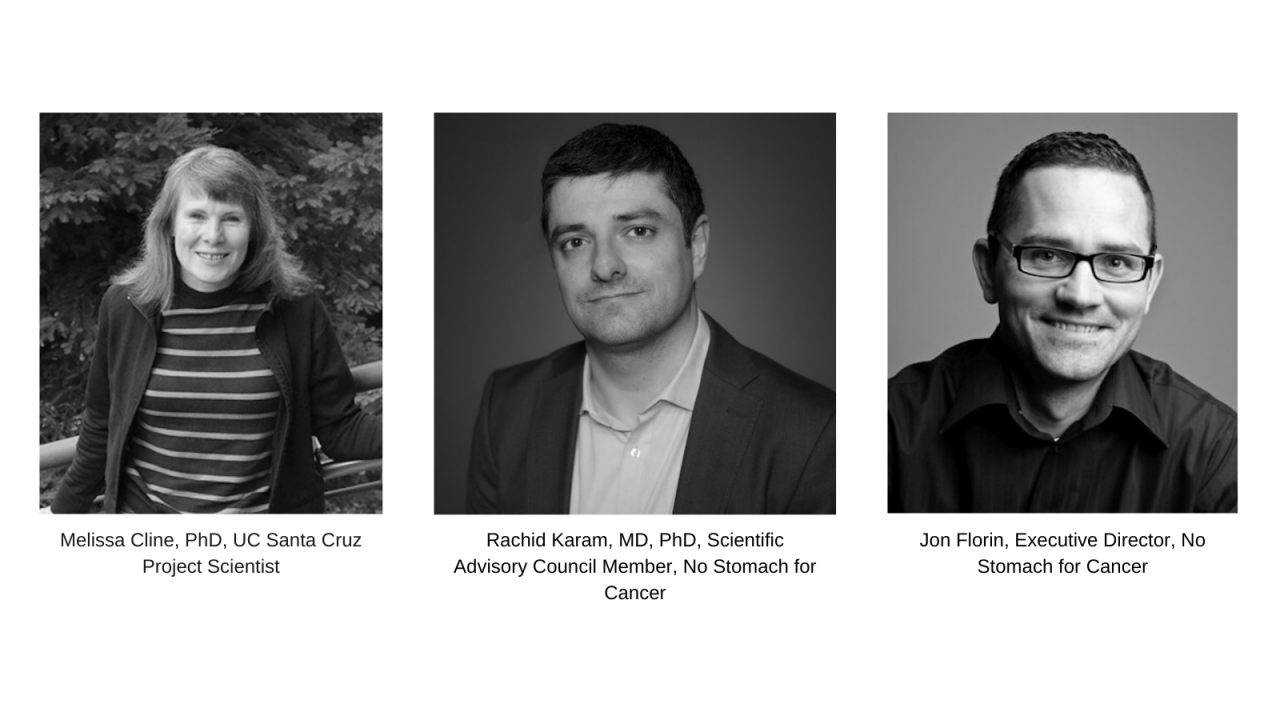UC Santa Cruz teams up, pools data to fight stomach cancer
The new genetic variant exchange aims to advance science and patient survival by combining vast amounts of gene variant data with corresponding clinical data.
 UCSC | November 24, 2020
UCSC | November 24, 2020
Coinciding with Stomach Cancer Awareness Month in November, the UC Santa Cruz Genomics Institute is teaming up with the patient advocacy nonprofit No Stomach For Cancer to release a web portal designed to help researchers identify individuals at risk of heritable stomach cancers.
Dr. Melissa Cline will lead the work at UC Santa Cruz to support a global initiative to increase access to genomic variant data. Dr. Cline previously developed brcaexchange.org, a web portal dedicated to sharing information on mutations in the BRCA1 and BRCA2 genes and their role in cancer.
Born from an international summit, launched in 2016, BRCA Exchange is now visited roughly 2,000 times each month. Its users include genetic counselors and researchers evaluating the clinical impact of BRCA mutations and individuals who carry BRCA mutations and want to understand what their mutations mean for themselves and their families.
The newly created CDH1 Exchange will follow the model of BRCA Exchange, providing a unified view of CDH1 variant data from public resources, and presenting those data with data analysis tools for researchers.
“My team is hard at work on the CDH1 Exchange, and we look forward to launching this spring,” Cline said. “We are excited that this collaboration with No Stomach For Cancer will allow us to apply a proven model to another dangerous cancer,” Cline said.
Stomach cancer is typically detected in later stages when it has already spread to nearby tissues, making it very deadly: The average five-year survival rate is 29.3%. Stomach cancer is the fifth most common cancer type, with more than one million new cases a year globally and 28,000 within the United States. (nostomachforcancer.org/about/statistics)
Hereditary Diffuse Gastric Cancer (HDGC) is a rare subtype of stomach cancer that arises through inherited mutations in some genes, most notably CDH1 (see rare diseases.info.nih.gov). It has an earlier age of onset and a worse prognosis than most stomach cancers.
Estimates vary significantly regarding the lifetime risk of stomach cancer for individuals who carry a cancer-causing CDH1 mutation. With the most significant variability dependent on study criteria and gender, estimates range from 42-70% for males and 33-56% for females. Studies also estimate that females with a pathogenic CDH1 mutation have an additional 39-55% lifetime risk of developing breast cancer. (Blair 2020)
What’s hopeful is that individuals who carry these mutations can manage risk with screening and risk-reducing surgeries. And it is important to note that not every CDH1 mutation increases an individual’s cancer risk.
“Identifying those mutations that increase the risk of cancer is an active area of research and one in which the UC Santa Cruz Genomics Institute is proud to participate,” Cline said.
No Stomach For Cancer Scientific Advisory Council member and Ambry Genetics R&D Director of Translational and Clinical Research Dr. Rachid Karam observed, “HDGC is a devastating disease. There are many different sources of good scientific information on CDH1 variants on the internet, but it’s challenging to see all the information in one place.” According to Karam, who is also part of the Clinical Genome (ClinGen) CDH1 Variant Curation Expert Panel, the leading international expert panel on CDH1 variants, “CDH1 Exchange will make this work so much easier.”
No Stomach For Cancer Executive Director Jon Florin recalled, “When I first saw BRCA Exchange, I was inspired to create a similar resource for CDH1 variants.” Florin continued, observing, “This will make a difference in the lives of people with a history of diffuse gastric cancer in their families. People will understand if they have inherited their family’s heritable cancer risk, and they can then have well-informed discussions with their doctors on how to manage the risk.”